A beautiful tournament for the beautiful game
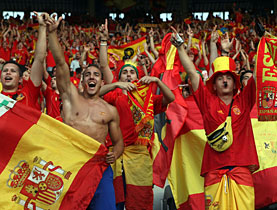
Euro 2008, the biggest event – sporting or otherwise – Switzerland has ever hosted has come to a happy end.
Commentators have hailed the quality of football, culminating in Spain’s win against Germany on Sunday, while politicians have described the tournament as a resounding success because of security, transport and ecological measures.
“It’s been a mega event. The third-biggest sporting event in the world has been organised with no problems,” Swiss Defence Minister Samuel Schmid declared on Sunday.
“In Switzerland we’ve had fewer traffic bottlenecks, less road congestion and even the crime rate dropped in some places.”
Chancellor Alfred Gusenbauer of co-hosts Austria described Euro 2008 as an ecologically orientated tournament and slammed the critics who had predicted chaos.
“This was a green European Championships because much of the traffic – long distance and in the cities – was carried by public transport,” he said.
“The negative scenarios that had been announced by certain prophets of doom, that city centres would be destroyed, that there would be hooligans all over the place, that the public parks would be ruined. All sorts of fears and anxieties had been expressed, but nothing like that happened.”
Indeed the sight of up to 100,000 orange-clad Dutch football fans peacefully – but loudly! – thronging through sleepy Bern was one of most memorable of the tournament.
Power strikes
Admittedly Euro 2008 wasn’t perfect: the weather could have been better – Uefa was embarrassed by a power cut during the Germany-Turkey semifinal; the stadiums were small by European standards and the fact that the Swiss and Austrians hosts left their own party early meant the general atmosphere failed to reach that of the World Cup in Germany in 2006.
But football is the name of the game, and on the pitch this was, by all expert accounts, the best European Championships ever.
Viewers – billions of them in 170 countries – were treated to quick, slick, attacking football played by well-oiled teams working together.
This tournament was all about attacking and playing to win. Turkey rode their luck to make it to the semifinals, but their ain’t-over-til-it’s-over attitude paid off.
Those teams that simply tried not to lose were punished – especially defending champions Greece, who deservedly failed to pick up a single point.
“The strikers clearly stole a lead over the defence – in particular those ageing central defenders who failed to cope with strikers who were constantly on their backs, right on the limit of offside,” said Swiss former player and coach Umberto Barberis.
Barberis, a consultant for swissinfo during Euro 2008, said one should also acknowledge those coaches who dared to take risks. “The older and more experienced coaches such as [Spain’s] Luis Aragonés or [Turkey’s] Fatih Terim were rewarded.”
The winners…
Spain, who finally ended their 44-year wait for a major footballing trophy, are the obvious winners of Euro 2008 – on Monday Xavi Hernandez was named the tournament’s best player – but there were many other memorable moments.
Croatia’s Ivan Klasnić became the first player ever to participate – and score – at a major tournament after a kidney transplant.
Slovakian referee Lubos Michel injected a welcome dose of common sense to refereeing when he reversed his red-card decision against Russia’s Denis Kolodin after his assistant flagged him over.
Among the players David Villa, Andrei Arshavin, Bastian Schweinsteiger and Fernando Torres all saw their stocks rise and Gianluigi Buffon confirmed he is the best goalkeeper in the world.
Uefa didn’t do badly out of the tournament either: sponsors and broadcasters paid European football’s governing body $2 billion (SFr2.04 billion), 35 per cent more than in 2004.
…and the losers
But for every winner there must be a loser, and there are several people who will be keen to forget Euro 2008.
British bookmakers and brewers, for example, had an appalling tournament. In 2004 William Hill made £100 million (SFr203 million) from English fans. This year enthusiasm was significantly less thanks to England’s no-show.
Referees managed to rein in excessive simulation by prima donnas, but the 2008 Oscar for Best Actor goes to Switzerland’s very own Ludovic Magnin for a shameful incident against Portugal. A boot grazed his stomach and he dropped to the floor clutching his face. Disappointing.
And of course now that Spain have broken their title drought, the crown of perennial under-achievers is up for grabs!
Step up England – it’s only 1,470 days until Euro 2012 kicks off in Poland and Ukraine…
At least 150 million television viewers worldwide have seen each match at Euro 2008, while an estimated record 300 million people were expected to watch Sunday’s final between Germany and Spain at Ernst Happel Stadium in Vienna – 30 million more than the Euro 2004 final, organisers said.
There have been 77 goals at Euro 2008 – 57 in the group matches – the same as in Portugal four years ago.
The peaceful atmosphere off the pitch was echoed on it: only three red cards were shown, to German midfielder Bastian Schweinsteiger, Turkish goalkeeper Volkan Demirel and French defender Eric Abidal.
Switzerland co-hosted the Euro 2008 football tournament with Austria from June 7-29.
The first round games were played in four cities in Switzerland (Basel, Bern, Geneva and Zurich) and four cities in Austria (Innsbruck, Klagenfurt, Salzburg and Vienna). The semifinals were hosted by Basel and Vienna and the final was held in Vienna on June 29.
The finals were broadcast in 170 countries and were expected to be watched by about eight billion cumulative TV viewers.

In compliance with the JTI standards
More: SWI swissinfo.ch certified by the Journalism Trust Initiative

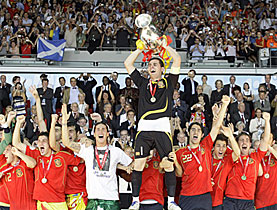
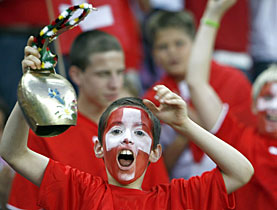
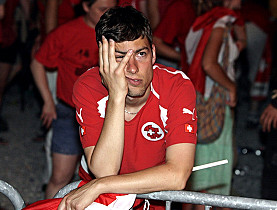
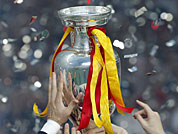
You can find an overview of ongoing debates with our journalists here. Please join us!
If you want to start a conversation about a topic raised in this article or want to report factual errors, email us at english@swissinfo.ch.